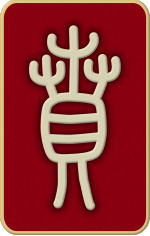
贲 Bì Elegance (Grace) [hexagram 22]


Mountain over Fire
 Earth element
Earth element
Lunar month: 8 ; Host (controlling) line : 6
The Decision
Elegance – there will be advantage if it is permitted to proceed.
‘Elegance – there will be some advantage’ – the weakness dissipates and decorates the strong so there will be satisfaction. Alternatively, as the strong decorates the weak there is only limited advantage if it is permitted. This is heavenly elegance, brightness in human elegance is modest compared to heaven’s refinement in the progress of the seasons. Studying society’s refinement can lead to transformation of all under Heaven.
贲: 亨. 小利有攸往. Bì: hēng. xiǎo lì yǒu yōu wǎng.
彖传: 贲, 亨; 柔来而文刚, 故亨. 分刚上而文柔, 故小利有攸往. 天文也; 文明以止, 人文也. 观乎天文, 以察时变; 观乎人文, 以化成天下. Tuàn zhuàn: Bì, hēng; róu lái ér wén gāng, gù hēng. fēn gāng shàng ér wén róu, gù xiǎo lì yǒu yōu wǎng. tiān wén yě; wén míng yǐ zhǐ, rén wén yě. guān hū tiān wén, yǐ chá shí biàn; guān hū rén wén, yǐ huà chéng tiān xià.
The Image
In ‘Adornment’ there is Fire at the foot of the Mountain. The wise bring brilliance to policies and do not presume to judge others.
象传: 山下有火, 贲; 君子以明庶政, 无敢折狱. Xiàng zhuàn: Shān xià yǒu huǒ, bì; jūn zǐ yǐ míng shù zhèng, wú gǎn zhé yù.
Line Change 1
The feet are elegant – leave the car and walk.
‘Leave the car and walk’ – there is virtue in walking.
初九: 贲其趾, 舍车而徒. Chū jiǔ: bì qí zhǐ, shè chē ér tú.
象传: 舍车而徒, 义弗乘也. Xiàng zhuàn: Shè chē ér tú, yì fú chéng yě.
Line Change 2
Grooming a beard.
‘Grooming a beard’ – making appropriate preparation.
六二: 贲其须. Liù èr: bì qí xū.
象传: 贲其须, 与上兴也. Xiàng zhuàn: Bì qí xū, yǔ shàng xīng yě.
Line Change 3
Elegant and freshly showered, if remain resolute all will be well.
‘If remain resolute all will be well’ – no rebuff will be administered.
九三: 贲如濡如, 永贞吉. Jiǔ sān: bì rú rú rú, yǒng zhēn jí.
象传: 永贞之吉, 终莫之陵也. Xiàng zhuàn: Yǒng zhēn zhī jí, zhōng mò zhī líng yě.
Line Change 4
Elegant in plain simplicity like a white, winged horse. An admirer not an abductor.
There is uncertainty of true motive but an admirer not an abductor; eventually there will be good fortune.
六四: 贲如皤如, 白马翰如, 匪寇婚媾. Liù sì: bì rú pó rú, bái mǎ hàn rú, fěi kòu hūn gòu.
象传: 六四, 当位疑也. 匪寇婚媾, 终无尤也. Xiàng zhuàn: Liù sì, dàng wèi yí yě. fěi kòu hūn gòu, zhōng wú yóu yě.
Line Change 5
Beautifying the hills and gardens. The ribbon is small and meager which may seem stingy but, ultimately, promising.
This brings joyful good fortune.
六五: 贲于丘园, 束帛戋戋, 吝, 终吉. Liù wǔ: bì yú qiū yuán, shù bó jiān jiān, lìn, zhōng jí.
象传: 六五之吉, 有喜也. Xiàng zhuàn: Liù wǔ zhī jí, yǒu xǐ yě.
Line Change 6
Pure white elegance, nothing wrong.
‘Pure white elegance, nothing wrong’ – wishes will be fulfilled.
上九: 白贲, 无咎. Shàng jiǔ: bái bì, wú jiù.
象传: 白贲无咎, 上得志也. Xiàng zhuàn: Bái bì wú jiù, shàng dé zhì yě.
The full set of 64 English translations is available in our new book 'Book of Changes - Deciphered' ➚.